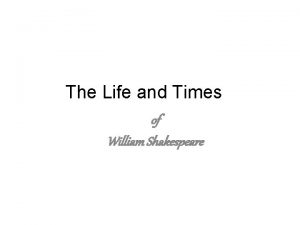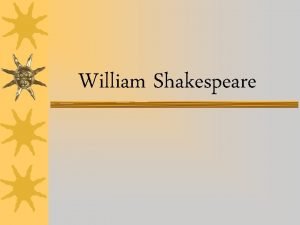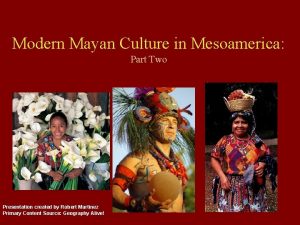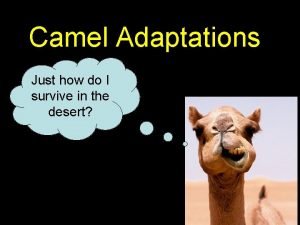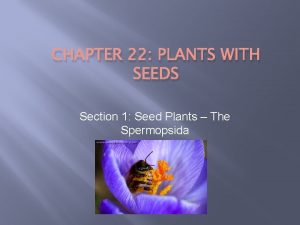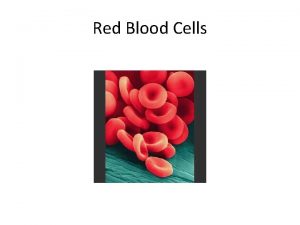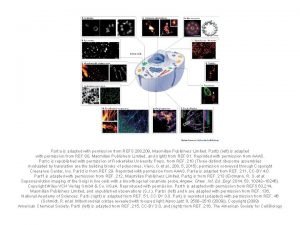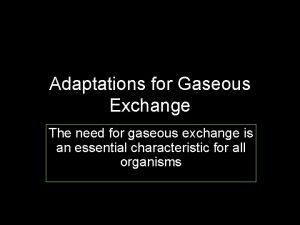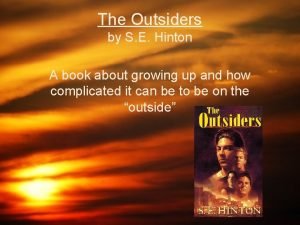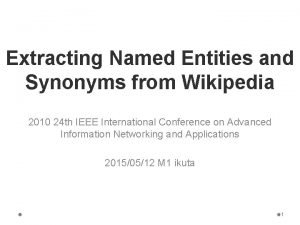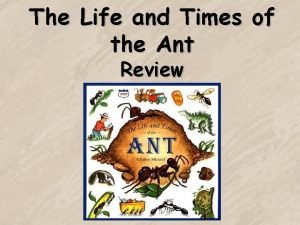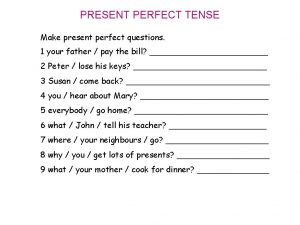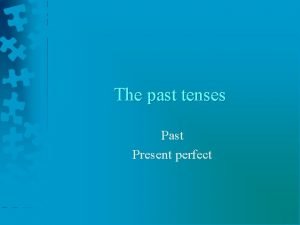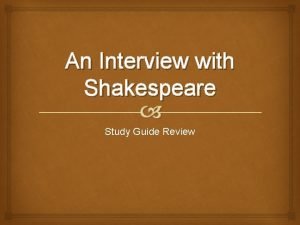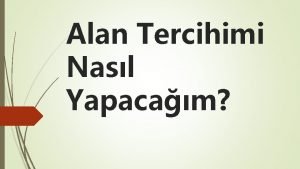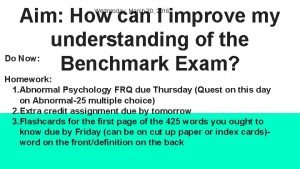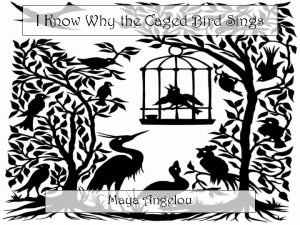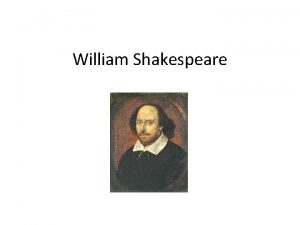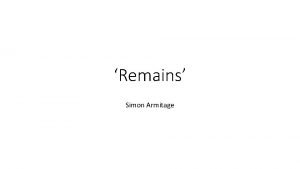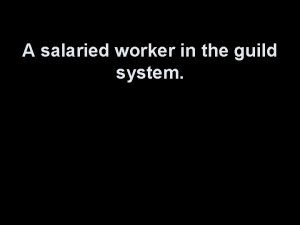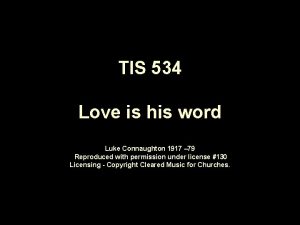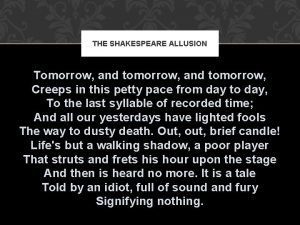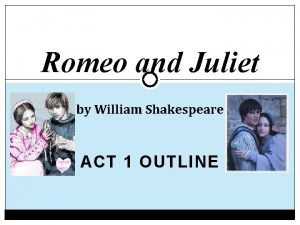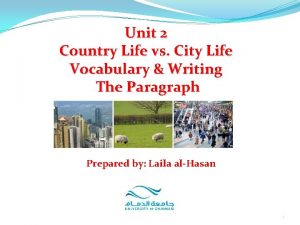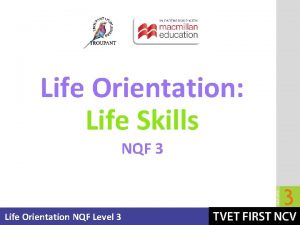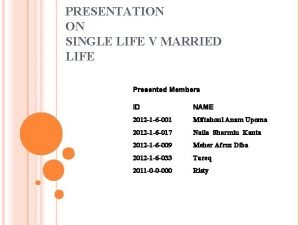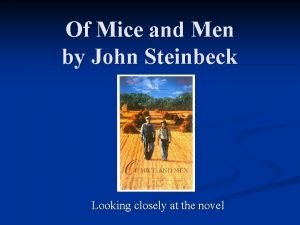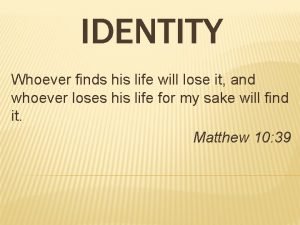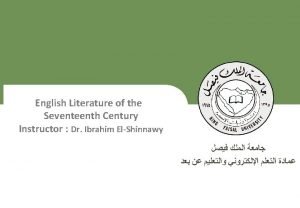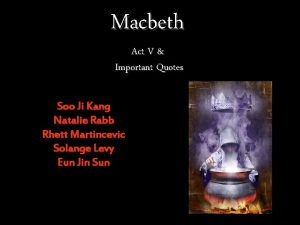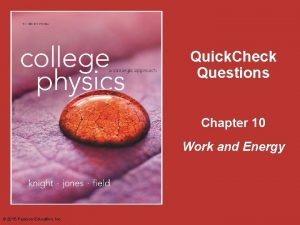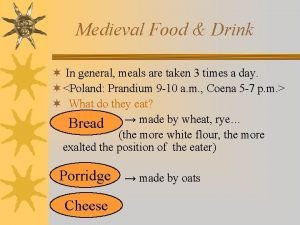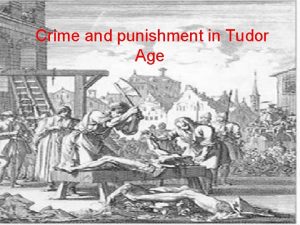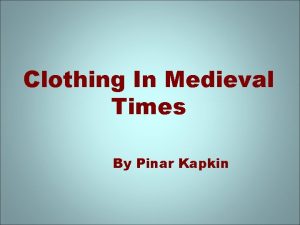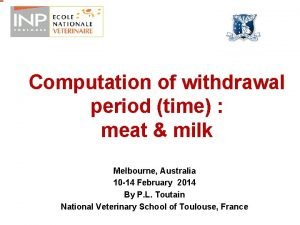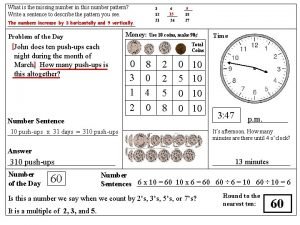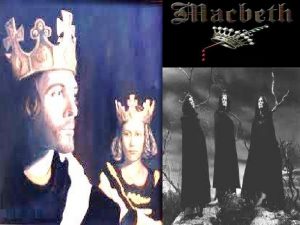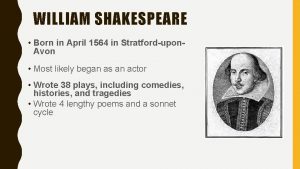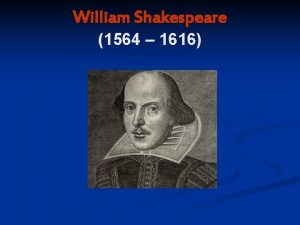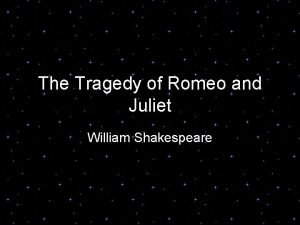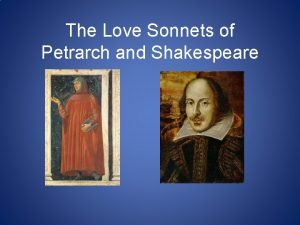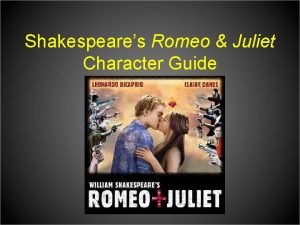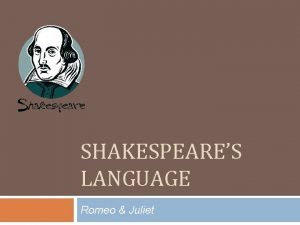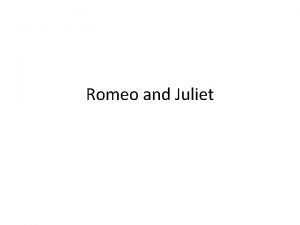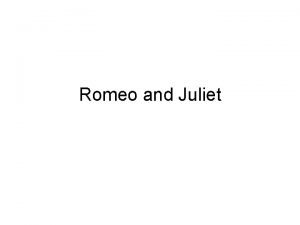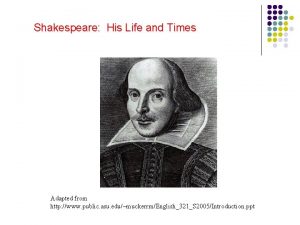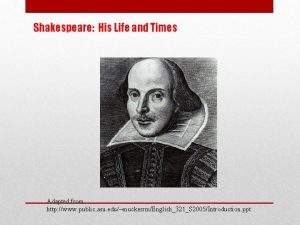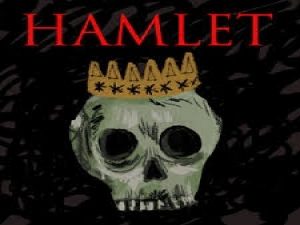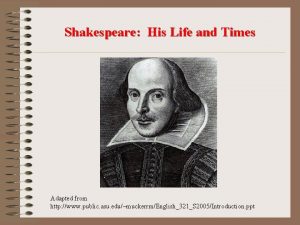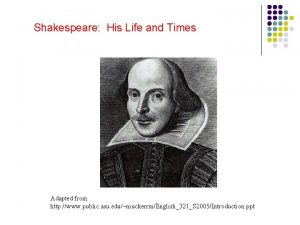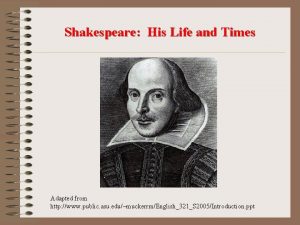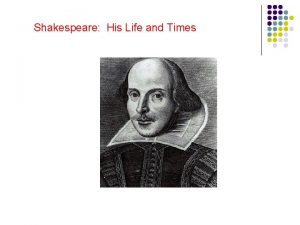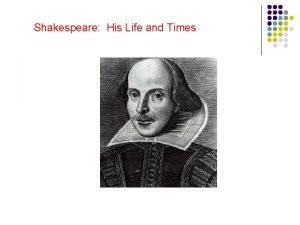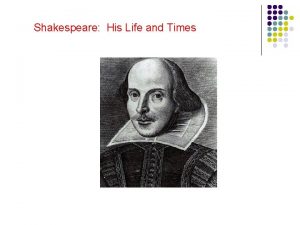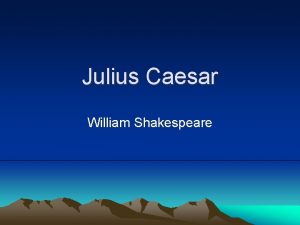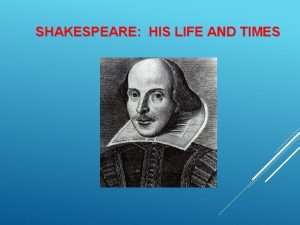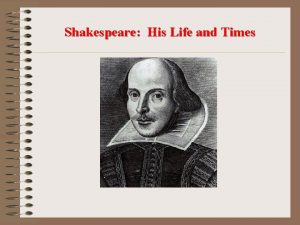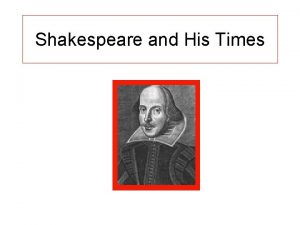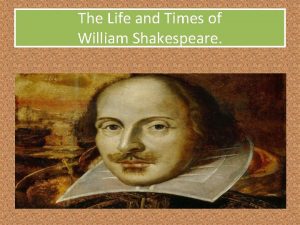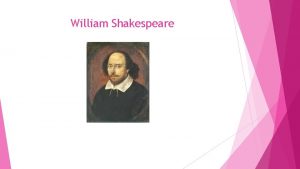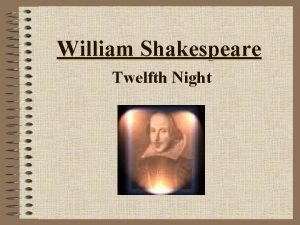Shakespeare His Life and Times Adapted from http











































































- Slides: 75

Shakespeare: His Life and Times Adapted from http: //www. public. asu. edu/~muckerrm/English_321_S 2005/Introduction. ppt

Early Life • Born 1564—died 1616 • Stratford-upon-Avon • Parents: John and Mary Arden Shakespeare • Mary—daughter of wealthy landowner • John—glovemaker, local politician

Great Britain, including England, Shakespeare’s home 3

England 4

Stratford-Upon-Avon, where Shakespeare was born and grew up London, where Shakespeare’s reputation was born (and where the Globe was located) 5

Stratford-on-Avon in Shakespeare’s Time As reproduced in William Rolfe, Shakespeare the Boy (1896).

Stratford-upon-Avon Today From Stratford’s web site: http: //www. stratford-upon-avon. co. uk/index. htm

Shakespeare’s Birthplace From: http: //perso. wanadoo. fr/danielle. esposito/

Education • Probably attended King’s New School in Stratford • His school day was long and rigorous Educated in: -Rhetoric -Logic -History -Latin • Shakespeare dropped out of ‘middle school’ when his father lost his fortune

By modern standards school would have been routine and dull Students spent 9 hours a day at school School was taught year-round, except for 3 brief holidays Studies were mainly in Latin 10

King’s New School From: http: //perso. wanadoo. fr/danielle. esposito/

Married Life • Married in 1582 to Anne Hathaway, who was pregnant at the time with their first daughter • Had twins in 1585 - Hamnet & Judith • Hamnet died from the plague at age 11 • Sometime between 1583 -1592, he moved to London and began working in theatre. • The years 1583 -1592 are know as ‘The Lost Years’ • No one know where he was, or what he was doing during those years

Anne Hathaway’s Home 13

1592 – First evidence that Shakespeare had moved to London and was working in theater mid-1592 -1594 – outbreak of plague closed the London theaters, so…. . Shakespeare began to write poetry Became well known for a 14 line poem called a sonnet 14

Shakespeare’s Sonnet 18 Shall I compare thee to a summer's day? Thou art more lovely and more temperate: Rough winds do shake the darling buds of May, And summer's lease hath all too short a date: Sometime too hot the eye of heaven shines, And often is his gold complexion dimm'd; And every fair from fair sometime declines, By chance or nature's changing course untrimm'd; But thy eternal summer shall not fade Nor lose possession of that fair thou owest; Nor shall Death brag thou wander'st in his shade, When in eternal lines to time thou growest: So long as men can breathe or eyes can see, So long lives this and this gives life to thee. 15

1594 – Shakespeare was part of a group that founded the company of players called Lord Chamberlain's Men (later called the King's Men) Lord Chamberlain's Men was a very successful company of players (actors) – by the turn of the century, they had the: best actor, Richard Burbage best theater, The Globe best playwright, W. Shakespeare 16

Theatre Career • Member and later part-owner of the Lord Chamberlain’s Men, later called the King’s Men • Globe Theater built in 1599 with Shakespeare as primary investor • Burned down in 1613 during one of Shakespeare’s plays

The Rebuilt Globe Theater, London

Note the open air design. The original Globe would have had a roof made of thatch. 19

Inside view of stage, upper stage, galleries, and the pit. 20

Elizabethan Theatrical Conventions

A theatrical convention is a suspension of reality. v No electricity v Women forbidden to act on stage v Minimal, contemporary costumes v Minimal scenery These control the dialogue.

v Soliloquy v Aside v Blood and gore v Use of supernatural Types of speech Audience loves to be scared.

v Use of disguises/ mistaken identity v Last speaker—highest in rank (in tragedies) v Multiple murders (in tragedies) v Multiple marriages (in comedies)

The Plays • 38 plays firmly attributed to Shakespeare • 14 comedies • 10 histories • 10 tragedies • 4 romances • Possibly wrote three others • Collaborated on several others

Shakespeare’s Death • Shakespeare died on April 23 rd, 1616 • Not exactly sure what he died from – History says he drank too much wine and ate too many pickled herrings • In his will, Shakespeare left money, horses, stables, etc. to his two sons-in-law • But only left his wife one thing- the “second-best bed” – Was he trying to make a point?

Shakespeare’s Death • Shakespeare is buried in Holy Trinity Church in his birth village of Stratford. • His grave is covered by a flat stone that bears an epitaph warning of a curse to come upon anyone who moves his bones.

Shakespeare’s Language It is not as difficult as it seems.

Language Change Languages do not just happen – they are the result of many of hundreds and even thousands of years of development. The English as we know it is relatively new and is in a constant state of change. Every day hundreds of new words enter the language and many are dropped. In addition, the English language is spoken in many dialects around the world.

• The English language contains about 300, 000 words, but your vocabulary is about 3000 and you get by on a daily basis with about 150. • By contrast, William Shakespeare had a vocabulary of 15, 000 words and invented many of the words and phrases that we still use today. • Let’s take a look at Old English how many people think Shakespeare wrote …

Old English – the following passage is from the time of King Alfred or about 800 A. D. • Faeder ure thu eart on heofonum, si thin nama gehalgod. Tobecume thin rice. Gewurthe thin willa on eorthan swa on heofonum. • Do you think you know what it means?

Middle English – the same phrase is written as it would have appeared in the time of Geoffrey Chaucer (13201384) • Oure fadir that art in heuenes, halwid be thi name; thi kyngdom cumme to; be thi wille don as in heuen and in erthe; gif to us this day ouer breed oure substaunce; and forgeue uo us oure dettis as we forgeue to oure dettours … • Does this one make a little more sense?

Modern English – here is the same passage as it appeared in 1611 or about the time of Shakespeare. • Our father, which art in Heaven, hallowed be thy name. Thy kingdom come; thy will be done on earth as it is in Heaven. Give us this day, our daily bread; and forgive us our debts as we forgive our debtors, and lead us not into temptation … • So is Shakespeare’s language all that different?

Shakespeare’s Language • Shakespeare did NOT write in “Old English. ” • Old English is the language of Beowulf: Hwaet! We Gardena in geardagum Þeodcyninga Þrym gefrunon Hu ða æÞelingas ellen fremedon! (Hey! We have heard of the glory of the Spear. Danes in the old days, the kings of tribes, how noble princes showed great courage!)

Shakespeare’s Language • Shakespeare did not write in “Middle English. ” • Middle English is the language of Chaucer, the Gawain-poet, and Malory: We redeth oft and findeth y-write— And this clerkes wele it wite— Layes that ben in harping Ben y-founde of ferli thing… (Sir Orfeo)

Shakespeare’s Language • Shakespeare coined many words we still use today: • Critical • Majestic • Dwindle • And quite a few phrases as well: • One fell swoop • Flesh and blood • Vanish into thin air See http: //www. wordorigins. org/histeng. htm

Shakespeare’s Language • A mix of old and very new • Rural and urban words/images • Understandable by the lowest peasant and the highest noble

• Learning to read Shakespeare is a bit like learning a foreign language, but it is well worth the effort. • Here a few tricks to understanding Shakespeare – this will help you impress the ladies as well !

1. Thou, thee and thy – These mean you, and your, respectively. These words dropped out of our language a couple centuries ago, but Shakespeare uses them. The verb that is used with “thou” changes as well. • Example: “ Thou wilt fall backward when thou hast more wit, Wilt thou not Jule? ” • Translation: You will fall backward when you have more wit, Will you not, Jule?

2. Inversion – Sometimes Shakespeare will invert the verb and the subject. • For instance, he might write, “Went I to Bellarmine. ” instead of “I Went to Bellarmine. ” • Example: “Then dreams he of another’s benefice. ” • Translation: He dreams of another’s benefice.

2. Inversion – Sometimes Shakespeare will invert the verb and the subject. • For instance, he might write, “Went I to Bellarmine. ” instead of “I Went to Bellarmine. ” • Example: “Then dreams he of another’s benefice. ” • Translation: He dreams of another’s benefice.

3. Diction – There are three problems with Shakespeare’s word choice. • First - he uses words that no longer exist in the English we speak. • Second - he uses words that are in our language, but now have a different meaning to us. • Third – he uses words that are in our language, but we simply don’t know what these words mean – you should look them up.

Some translations to help you … still = always soft = slowly, gently mark = listen an = if fell = cruel, fierce, deadly to-night = last night perforce = we must, you must kind = true to one’s nature ay = yes fain = gladly marry = swear word anon = at once plague, pox, ague = disease wherefore= why THESE ARE JUST A FEW OF THE DIFFICULT WORDS …

4. Contractions – for purposes of rhythm Shakespeare uses contractions to cut out syllables. • Examples: – o’ = on – th’ = the – i’ = in – ‘t – it – ta’en = taken – ‘em = them – ‘a = he (often) – o’er = over

Copy these lines down and translate them on a separate piece of paper. 1. For I ne’er saw true beauty till this night. 2. Tickling a parson’s nose as a’ lies asleep. 3. O Romeo, Romeo! Wherefore art thou Romeo? 4. Do not swear at all/ or, if thou wilt, swear by thy gracious self … 5. A plague a both your houses. 6. Tybalt, liest thou there in thy bloody sheet?

To be or not to be? What’s the question

To be or not to be? That is the question! Wait a second!!! To my own self be true Then thou canst not be false to any man Be quiet Will! What’s going on And it must follow as the night and the day.

Tragedy • A serious play or drama typically dealing with the problems of a central character, leading to an unhappy or disastrous ending brought on, as in ancient drama, by a fate and a tragic flaw in this character, or in modern drama, usually by moral weakness, psychological maladjustment or social pressures.

Tragic Hero • A person of high rank who is brought to eventual ruin by a flaw in his/her character. – Example: Macbeth’s tragic flaw is his ambition which leads him into a series of bloody and increasingly indefensible acts.

Comedy • A drama or narrative with a happy ending or non-tragic theme. – Comedy of manners- depicts and satirizes the manners and customs of fashionable society. – High comedy- appeals to and reflects the life and problems of the upper social classes, characterized by a witty, sardonic treatment. – Low comedy- farce, slap stick, burlesque, horse play

Journal Entry : January 20, 2015 • If you were going to write a book, what would the main character be like? • List ten characteristics.

Act I : Scene I • What effect does Gregory and Sampson’s crass joking have on the mood of the scene? • What do Benvolio and Tybalt have in common? How are they different? • How does Prince characterize Capulet and Montague? • What does Romeo’s speaking in paradoxes suggest about his current state of mind? • What other Shakespearean texts reflect this idea that beauty must be preserved or immortalized?

Journal Entry : January 21, 2015 • Copy the notes and respond to the question: • In literature, a character foil is a character who contrasts with another character(usually the protagonist) in order to highlight particular qualities of the other character. • Based on the definition above, what is one example of a character foil in Romeo and Juliet?

Act I Scene II • 1. Count Paris asks Lord Capulet if he may marry Juliet. • a. Who is Count Paris? . • b. How old is Juliet? • c. What condition does Lord Capulet make on Juliet’s behalf concerning the proposal? • 2. Why does Romeo decide to gatecrash the Capulets’ feast? • 3. How are Benvolio’s words ‘And she shall scant show well that now seems best’ prophetic?

Act I Scene III • What do we learn of the Nurse’s character in this scene? • 2. Lady Capulet, the Nurse and Juliet reveal different attitudes to love and marriage. Write a detailed description of each’s view of love and marriage, making close reference to the text.

Romeo and Juliet – the lighter side The comedic elements in Shakespeare’s lyrical tragedy

What was the C word? • Romeo and Juliet is a play about contrasts. These contrasts include • Light and dark • Night and day • Young and old • Love and hate • And…

• Tragedy and comedy! • Think also about the contrasts between illusion and reality • And the characters: • Romeo and Mercutio • The nurse and Lady Capulet • The nurse and Mercutio

Why include comedy in a tragedy? • It heightens the contrast • It gives the audience an emotional break • It diminishes the tension evoked in the tragic scenes • It delights the audience • It adds variety • When integrated with the plot, it can counterpoint & enhance the serious significance

Does it have a formal name? • YES! Comic relief! • “the introduction of comic characters, speeches, or scenes in a serious or tragic work, especially in dramas. Comic relief was universal in Elizabethan tragedies. ” M. H. Abrams

Where’s the comedy? • Two renowned comic characters in Romeo and Juliet are • Mercutio • The nurse

What makes us laugh? • Aside • Contrasts • exaggeration • Poking fun • Puns • Word play

Bawdy jokes to settle the folks… • Gregory: The quarrel is between our masters and us their men. • Sampson: ‘Tis all one. I will show myself a tyrant. When I have fought with men, I will be civil with the maids—I will cut off their heads. • Gregory: The heads of the maids? • Sampson: Ay, the heads of the maids or their maidenheads. Take it in what sense thou wilt. 1. 1. 19 - 26

Think about it!!! William Shakespeare’s plays feature sexual situations and references, violence, gore, and profanity. His plays are widely taught in schools throughout the country. Many books and movies made today have the same features. Why do you think you are restricted from reading books and watching movies with these features but you can read Shakespeare’s plays in school?

And soon after… • Sampson: I do bite my thumb, sir. • Abram: Do you bite your thumb at us, sir? • Sampson: (aside to Gregory) Is the law of our side if I say ay? • Gregory: (aside to Sampson) No. • Sampson: No, sir, I do not bite my thumb at you, sir; but I bite my thumb, sir. 1. 1. 44 – 51

Romeo’s wit “Give me a torch. I am not for this ambling. Being but heavy, I will bear the light. ” 1. 4. 11 -12

“come, instance” • Friar: Our Romeo hath not been in bed tonight. • Romeo: The last was true. The sweeter rest was mine. • Friar: God pardon sin! Wast thou with Rosaline? 2. 3. 41 - 43

How does Tybalt trigger comedy? • Benvolio: Nay, he will answer the letter’s master [Tybalt], how he dares, being dared. • Mercutio: Alas poor Romeo, he is already dead: stabbed with a white wench’s black eye; run through the ear with a love song; the very pin [center] of his heart cleft with the blind bowboy’s butt-shaft… 2. 4. 11 - 15

And then. . Mercutio: …follow me this jest now till thou hast worn out thy pump, that, when the single soul of it is worn, the jest may remain, after the wearing, solely singular. Romeo: O single-soled jest, solely singular for the singleness*! 2. 4. 63 - 69 *pun on silliness

What about getting the goose? • Mercutio: I will bite thee by the ear for that jest. • Romeo: Nay, good goose, bite not! • Mercutio: Thy wit is a very bitter sweeting; it is a most sharp sauce. 2. 4. 79 – 82

Upon the nurse’s arrival… • Nurse: My fan, Peter • Mercutio: Good Peter, to hide her face; for her fan’s the fairer face. • Nurse: God ye good morrow, gentlemen. • Mercutio: God ye good-den, fair gentlewoman. • Nurse: Is it good-den? • Meructio: ‘Tis no less…for the bawdy hand of the dial is now upon the prick of noon. 2. 4. 107 - 115

Thematically? “Laugh as we may, Romeo clearly lives in a world where folly can have serious consequences; and we are no longer confident that the conventions of comedy will save him from those consequences or spare us the pain of seeing him destroyed. ” Sylvan Barnet

Catharsis • The purging or purifying of the emotions or relieving of emotional tension, especially by art. (This concept was applied originally by Aristotle to the effects of tragic drama on the audience. )

Conflict • The struggle or interplay of forces, that takes place within the story. • The main character may be in conflict with another person, value system, fate or with nature.

Plot • The sequence of events that create and then resolve a conflict. Plot movement: Climax (peak tension) or Crisis (dramatic turning point) Falling action Rising action (fall of tragic hero) Resolution or Denouncement Beginning of story (Point at which conflict ends and outcome is made clear)
 When and where was shakespeare born
When and where was shakespeare born The life and times of william shakespeare
The life and times of william shakespeare Shakespeare life and times
Shakespeare life and times In what ways have the highland maya adapted to modern life?
In what ways have the highland maya adapted to modern life? Mensajes subliminales camel
Mensajes subliminales camel Spermopsida plants
Spermopsida plants William shakespeare about his life
William shakespeare about his life Mat0022
Mat0022 This passage is adapted from jane austen
This passage is adapted from jane austen Red blood cells are
Red blood cells are Adapted with permission from
Adapted with permission from Xerophytes diagram
Xerophytes diagram Chaparral biomass
Chaparral biomass Sausage shaped organelles
Sausage shaped organelles The two brothers adapted
The two brothers adapted Adapted from the internet
Adapted from the internet How is amoeba adapted for gas exchange bbc bitesize
How is amoeba adapted for gas exchange bbc bitesize How have plants adapted to the rainforest
How have plants adapted to the rainforest The outsiders adapted for struggling readers
The outsiders adapted for struggling readers Pattern synoynm
Pattern synoynm How are giraffes long necks adapted to their lifestyle
How are giraffes long necks adapted to their lifestyle The life and times of an ant
The life and times of an ant Present perfect tense for make
Present perfect tense for make Hurry present perfect sentence
Hurry present perfect sentence An interview with shakespeare study guide
An interview with shakespeare study guide Http //mbs.meb.gov.tr/ http //www.alantercihleri.com
Http //mbs.meb.gov.tr/ http //www.alantercihleri.com Siat.ung.ac.id
Siat.ung.ac.id Martin fell off his skateboard and badly bruised his elbow
Martin fell off his skateboard and badly bruised his elbow Macbeth act 1 scene 5 analysis
Macbeth act 1 scene 5 analysis Mi nombre sandra cisneros
Mi nombre sandra cisneros Caged bird metaphor
Caged bird metaphor William shakespeare timeline
William shakespeare timeline His blood shadow stays on the street
His blood shadow stays on the street Is baking bread endothermic or exothermic
Is baking bread endothermic or exothermic Listen mr jones the piano
Listen mr jones the piano The claim of papal supremacy held that
The claim of papal supremacy held that A salaried worker in the guild system
A salaried worker in the guild system Love is his word
Love is his word Kurt vonnegut tomorrow and tomorrow and tomorrow
Kurt vonnegut tomorrow and tomorrow and tomorrow An introduction to shakespeare and romeo and juliet part 1
An introduction to shakespeare and romeo and juliet part 1 City life and country life paragraph
City life and country life paragraph Slidetodoc.com
Slidetodoc.com Benefits of arranged marriage
Benefits of arranged marriage Unit 8 country life and city life
Unit 8 country life and city life Steve jobs timeline of life
Steve jobs timeline of life Key quotes in remains simon armitage
Key quotes in remains simon armitage John steinbeck adjectives to describe his life
John steinbeck adjectives to describe his life Why does carlson insist on shooting candy’s dog
Why does carlson insist on shooting candy’s dog Whoever finds their life will lose it
Whoever finds their life will lose it Two daffodils poem
Two daffodils poem Whoever keeps his life will lose it
Whoever keeps his life will lose it Boltzmann gravestone
Boltzmann gravestone Important quotes macbeth
Important quotes macbeth Thermoplastics can be heated and shaped many times
Thermoplastics can be heated and shaped many times Force and work relationship quick check
Force and work relationship quick check Medieval times food and drink
Medieval times food and drink Earthquake p-wave and s-wave travel time graph
Earthquake p-wave and s-wave travel time graph Tudor crime and punishment
Tudor crime and punishment Medieval merchant clothing
Medieval merchant clothing Meat and milk withdrawal times
Meat and milk withdrawal times Quarter to 7 in digital time
Quarter to 7 in digital time Meal times in england
Meal times in england Survive and thrive in times of change
Survive and thrive in times of change Fallen cherub to be weak is miserable
Fallen cherub to be weak is miserable Shakespeare brief and naughty
Shakespeare brief and naughty When was shakespeare born
When was shakespeare born When was william shakespeare born and when did he die
When was william shakespeare born and when did he die William shakespeare birth date
William shakespeare birth date The tragedy of romeo and juliet by william shakespeare
The tragedy of romeo and juliet by william shakespeare The tragedy of romeo and juliet by william shakespeare
The tragedy of romeo and juliet by william shakespeare Petrarch love sonnets
Petrarch love sonnets Lord montague character traits
Lord montague character traits Blank verse romeo and juliet
Blank verse romeo and juliet Romeo and juliet sonnet 18
Romeo and juliet sonnet 18 The tragedy of romeo and juliet summary
The tragedy of romeo and juliet summary Who wrote romeo and juliet
Who wrote romeo and juliet

